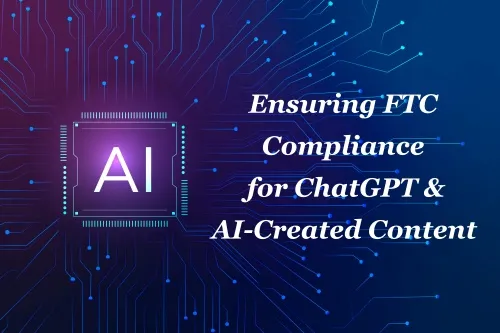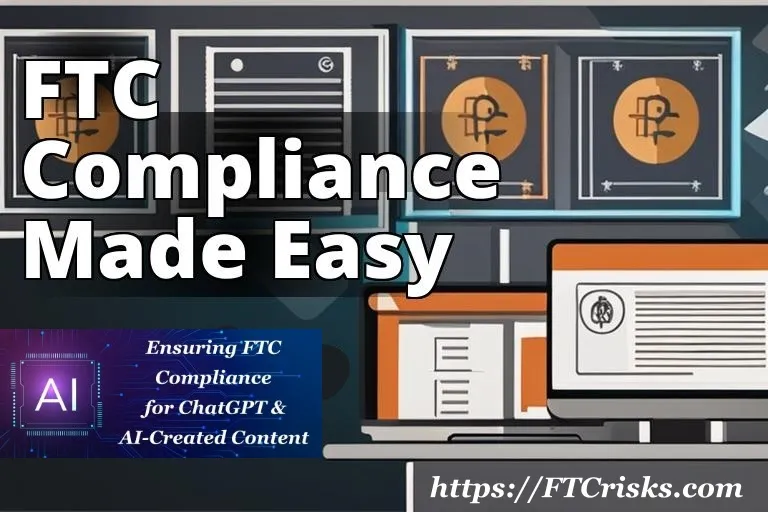Ensuring FTC Compliance for ChatGPT and AI-Created Content
How To Follow FTC Compliance Guidelines For ChatGPT and AI Created Content
By reading this article, you will learn:
- The importance of FTC compliance for ChatGPT and AI-created content.
- Key guidelines to follow for FTC compliance in relation to ChatGPT and AI-created content.
- How to ensure transparency and disclosure in AI-generated content to meet FTC requirements.
As artificial intelligence (AI) technology continues to advance, it has become increasingly common to see AI-generated content being used in various industries. One area where AI-generated content is gaining significant traction is in chatbots and virtual assistants. These AI-powered tools offer businesses the opportunity to provide personalized and interactive experiences to their customers. However, with the rise of AI-generated content, it is crucial for businesses to understand and follow the Federal Trade Commission (FTC) compliance guidelines to ensure transparency and avoid potential legal issues.

Table of Contents
Understanding the FTC Guidelines
The FTC is responsible for enforcing consumer protection laws in the United States. When it comes to AI-generated content, the FTC has specific guidelines that businesses must adhere to. These guidelines aim to ensure that consumers are not misled or deceived by AI-generated content and that they have a clear understanding of the nature of the content they are interacting with.
One of the key aspects of the FTC guidelines is the requirement for businesses to disclose when AI technology is being used to generate content. This means that if your chatbot or virtual assistant is powered by AI, you need to make it clear to users that they are interacting with an AI system. The disclosure should be prominent and easy to understand, ensuring that users are aware that the responses they receive are generated by AI algorithms.
Implementing FTC Compliance for ChatGPT and AI-Created Content
To ensure compliance with FTC guidelines for chatbots and virtual assistants powered by ChatGPT or other AI technologies, businesses can follow several best practices:
1. Clear and Prominent Disclosure
As mentioned earlier, the FTC requires businesses to provide a clear and prominent disclosure when AI-generated content is being used. This can be done by including a statement at the beginning of the conversation or prominently displaying a disclosure within the chat interface. The disclosure should inform users that the content is AI-generated and that they are interacting with a virtual assistant or chatbot.
2. Avoiding Misleading Representations
The FTC guidelines also emphasize the importance of avoiding misleading representations. This means that businesses should not make false or exaggerated claims about the capabilities of their AI-powered chatbots or virtual assistants. The content generated by the AI system should be accurate and not mislead users into thinking they are interacting with a human.

3. Transparent Data Collection and Use
Another aspect of FTC compliance is transparency in data collection and use. If your AI system collects user data during interactions, it is essential to clearly disclose what data is being collected and how it will be used. This includes providing information about data storage, data sharing practices, and any third parties involved in data processing. Users should have a clear understanding of how their data is being used to ensure transparency and build trust.
4. Regular Monitoring and Testing
To maintain FTC compliance, it is crucial to regularly monitor and test your AI system. This includes reviewing the generated content to ensure it aligns with the guidelines and making necessary adjustments to improve compliance. Regular monitoring and testing can help identify any potential issues or areas for improvement, allowing businesses to address them promptly and avoid any compliance violations.
5. Educating Your Team
Ensuring FTC compliance for AI-generated content requires educating your team about the guidelines and best practices. Your content creators, developers, and customer service representatives should have a clear understanding of the FTC guidelines and how they apply to your AI-powered systems. Providing training and resources to your team can help ensure that everyone involved is aware of their responsibilities and can contribute to maintaining compliance.
The Benefits of FTC Compliance
Following FTC compliance guidelines for ChatGPT and AI-created content offers several benefits for businesses:
1. Legal Protection
By adhering to the FTC guidelines, businesses can protect themselves from potential legal issues. Non-compliance with FTC regulations can result in significant fines and damage to a company's reputation. By taking the necessary steps to ensure compliance, businesses can mitigate the risk of legal consequences and maintain a positive brand image.
2. Consumer Trust
Transparency and clear disclosures regarding the use of AI-generated content can help build trust with consumers. When users are aware that they are interacting with an AI system, they can make informed decisions and have realistic expectations. This transparency fosters trust and enhances the user experience, leading to better customer satisfaction and loyalty.
3. Enhanced User Experience
Following FTC compliance guidelines can also contribute to an enhanced user experience. When users are aware that the content they are interacting with is AI-generated, they can adjust their expectations accordingly. This helps to manage user expectations and ensures that the AI system is used appropriately, resulting in a more positive and satisfactory user experience.

One of the challenges that businesses face when using AI-generated content is ensuring compliance with the guidelines set by the Federal Trade Commission (FTC). To illustrate this point, let's take a look at Sarah's experience with ChatGPT.
Sarah is the owner of an e-commerce store that sells beauty products. She recently started using ChatGPT to generate product descriptions for her website. The AI-powered tool allowed her to quickly generate unique and engaging content.
However, Sarah soon realized that some of the product descriptions generated by ChatGPT were making exaggerated claims about the effectiveness of certain products. Concerned about potential FTC violations, she decided to take action.
Sarah reached out to a legal expert who specializes in FTC regulations. The expert advised her to carefully review and edit the AI-generated content to ensure compliance. Sarah also implemented a system where all the product descriptions were reviewed by a human editor before being published on her website. This additional layer of oversight helped her catch any misleading claims and make the necessary changes.
As a result of Sarah's proactive approach to FTC compliance, she not only avoided potential legal issues but also built trust with her customers. By taking the time to review and edit the AI-generated content, she was able to maintain transparency and accuracy in her product descriptions.
Sarah's experience highlights the importance of being vigilant when using AI-generated content. It is crucial for businesses to understand and comply with FTC guidelines to avoid misleading consumers and potential legal consequences. By implementing effective review processes and working with legal experts, businesses can harness the power of AI while maintaining ethical and compliant practices.
Sign Up for FTC Guardian
To simplify the process of ensuring FTC compliance for ChatGPT and AI-created content, consider signing up for FTC Guardian. FTC Guardian is a comprehensive compliance management platform that helps businesses navigate the complexities of FTC regulations. With features such as automated compliance monitoring, content review tools, and educational resources, FTC Guardian provides the necessary tools to maintain FTC compliance and protect your business.
In conclusion.
As AI technology continues to evolve, it is crucial for businesses to understand and follow FTC compliance guidelines for ChatGPT and AI-created content. By implementing clear disclosures, avoiding misleading representations, being transparent with data collection and use, regularly monitoring and testing, and educating your team, you can ensure compliance and reap the benefits of legal protection, consumer trust, and an enhanced user experience. Consider signing up for FTC Guardian to simplify the process of maintaining FTC compliance and safeguarding your business in the ever-evolving landscape of AI-generated content.
Frequently Asked Questions
Disclaimer:
The information provided in this article was generated By AI and is for educational purposes only and does not constitute legal advice. It's important to consult legal professionals specializing in FTC compliance for specific advice related to your business.
References:
The FTC Act’s prohibition on deceptive or unfair conduct can apply if you make, sell, or use a tool that is effectively designed to deceive – even if that’s not its intended or sole purpose. So consider:
https://www.ftc.gov/business-guidance/blog/2023/03/chatbots-deepfakes-voice-clones-ai-deception-sale
Another version of this article was posted on Medium - https://medium.com/@david_98794/ensuring-ftc-compliance-for-chatgpt-and-ai-created-content-c20d9eb06f60
About the Author:
This blog post was written in conjunction with AI and David Salvidge, the founder and senior partner of Padco Marketing LLC, who are doing business as FTC Risks. Padco Marketing LLC is also a verified member of FTC Guardian, who assist our websites in complying the our legal obligations. We promote FTC Guardian as we know that every business that operated online need their services to protect their businesses and assets against FTC litigation.
FTCrisks.com has No Affiliation with the Federal Trade Commission
This website is a commercial website owned by Padco Marketing LLC., a Wyoming company. We are not affiliated with, or endorsed by, the Federal Trade Commission (FTC) or any other governmental or regulatory agency. The products and services offered on this site are not associated, affiliated, endorsed, or sponsored by the FTC, nor have they been reviewed, tested or certified by the FTC.
Copyright © 2025 FTC Risks. All rights reserved.
FTC Risks is a division (DBA) of Padco Marketing LLC.
Sheridan, Wyoming 82801
This blog was built using GroovePages




